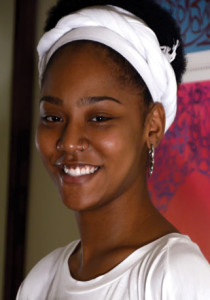KAT IE ACOSTA
IE ACOSTA
Associate Professor | Sociology, Center for Latin American & Latino/a Studies. Georgia State University
Dr. Katie Acosta’s research is focused on the experiences of LGBTQ individuals and their families. Her first book Amigas y Amantes: Sexually Nonconforming Latinas Negotiate Family explores how lesbian, bisexual, and queer (LBQ) women do family. More specifically, Amigas y Amantes highlights how LBQ Latinas understand femininity, negotiate their religious faiths, overcome the challenges of being in interracial/interethnic relationships, raise their children, and integrate their families of choice and origin. It is available through Rutgers University Press.
Her latest research project addresses the unique needs of lesbian stepparent families. This project looks at the unique experiences of same sex parents who together are raising children from previous relationships. This project is designed to better explore the legal, social, and interpersonal, issues these families face and the affect they have on their daily lives. When she am not conducting research or writing about it, Dr. Acosta teach courses on gender, family, and race and ethnicity. As an educator, Dr. Acosta enjoys challenging students to think critically, question the taken for granted and envision alternatives to existing social injustices. Prior to joining the sociology department at Georgia State, she was an assistant professor at Tulane University in New Orleans.
 DAVID BROTHERTON
DAVID BROTHERTON
Professor | Department of Sociology. John Jay College of Criminal Justice
Dr. Brotherton grew up in the East End of London, England where he worked in various blue-collar jobs while organizing labor and youth. He came to the United States in the 1980’s, working toward his Ph.D. degree at the University of California, Santa Barbara while teaching public high school in San Francisco. Dr. Brotherton gained his doctorate in Sociology in 1992 and began work on street gang subcultures at U.C. Berkeley in the same year. In 1994, Dr. Brotherton came to John Jay College of Criminal Justice where he continued his research and teaching on youth resistance, marginalization, and deportation co-founding the Street Organization Project in 1997.
He has received numerous research grants from both private and public agencies and has published widely in journals, books, newspapers and magazines. In 2003 and 2004 Dr. Brotherton co-organized the first academic conferences on deportation in the Caribbean and the United States respectively. He received the Praxis award for contributions to social justice from the Critical Criminology Section of the American Society of Criminology in 2015, named Critical Criminologist of the Year in 2011 and won the Choices award for “Keeping Out the Other” in 2008. He has also been nominated for the 2011 George Orwell Prize in England and the C.Wright Mills Award in the United States.
Among his recent books are: Immigration Policy in the Age of Punishment: Detention, Deportation and Border Control with Phil Kretsedemas (New York: Columbia 2017); Las Pandillas Como Movimiento Social with Luis Barrios (University of Central America Press 2016); Street Gangs: A Critical Appraisal (Routledge 2015); Banished to the Homeland: Dominican Deportees and Their Stories of Exile, with Luis Barrios (Columbia 2011); Keeping Out The Other: A Critical Introduction to Immigration Control, edited with P. Kretsedemas (Columbia 2009); and The Almighty Latin King and Queen Nation: Street Politics and the Transformation of a New York City Gang, with Luis Barrios (Columbia 2004). Dr. Brotherton is the editor of the “Studies in Transgression” book series at Columbia University Press and his current research projects include an evaluation study at the Department of Youth and Rehabilitation Services in Washington D.C., a criminological investigation of citizenship security in Ecuador, and a performance-based sociological study of immigration removal hearings in New York City.
 ARIANA BROWN
ARIANA BROWN
Poet | MFA in progress. University of Pittsburgh
Ariana Brown is a Black Mexican American poet from San Antonio, Texas, with a B.A. in African Diaspora Studies and Mexican American Studies from UT Austin. She is the recipient of two Academy of American Poets Prizes and a 2014 collegiate national poetry slam champion. An alum of Brave New Voices, Ariana’s work has been featured in PBS, Huffington Post, Blavity, For Harriet, and Remezcla.
Ariana, who has been dubbed a “part-time curandera,” has performed across the U.S. at venues such as the San Antonio Guadalupe Theater, Tucson Poetry Festival, University of Illinois-Urbana Champaign, and the San Francisco Opera Theatre. When she is not onstage, she is probably eating an avocado, listening to the Kumbia Kings, or validating black girl rage in all its miraculous forms. Her work is published in Nepantla, Muzzle, African Voices, Borderlands: Texas Poetry Review and ¡Manteca!: An Anthology of Afro-Latin@ Poets from Arte Público Press. She is currently earning an MFA in Poetry at the University of Pittsburgh. Follow Ariana on Twitter and Instagram @arianathepoet.
 ALAN PELAEZ LOPEZ
ALAN PELAEZ LOPEZ
Poet | Visual Artist, The Department of Ethnic Studies. UC Berkeley
Alan Pelaez Lopez is an Afro-Indigenous poet, collage, installation and adornment artist from Oaxaca, México. In their visual and literary work, they explore the intersections of PTSD, undocumented immigration, Indigeneity, queer feelings, and Black flesh. They are a 2017 Pushcart Prize nominee, named one of “10 Up and Coming Latinx Poets You Need to Know” by Remezcla, and one of “10 Poets for the Revolution,” in Best American Poetry Blog. Follow them at @migrantscribble on all social media.
 ZAIRE DINZEY-FLORES
ZAIRE DINZEY-FLORES
Associate Professor | Department of Latino and Caribbean Studies, Department of Sociology. Rutgers
Professor Dinzey-Flores is an Associate Professor in Department of Latino and Caribbean Studies and the Department of Sociology. Her research focuses on understanding how urban space mediates community life and race, class, and social inequality. She uses an interdisciplinary lens (sociology, urban planning, public policy), mixed-method approaches, and often a comparative Caribbean-U.S. framework, to investigate the processes that cement the built environment and unequally distribute power. She is particularly interested in housing and urban residential (housing and neighborhood) design: the underlying logics and policies that drive design, how design is interpreted, used, and experienced, and the consequences for inequality among communities and residents of cities.
Her book, Locked In, Locked Out: Gated Communities in a Puerto Rican City (University Of Pennsylvania Press: 2013), winner of the 2014 Robert E. Park Award of the Community and Urban Sociology Section (CUSS) of the American Sociological Association and an Honorable Mention of the 2014 Frank Bonilla Book Award of the Puerto Rican Studies Association, examines race and class inequality as they are recreated, contained, and negotiated through urban policy, the physical built environment, and community gates in private and public housing.
Dinzey-Flores is currently working on two projects: the first is a mixed-method examination of how race is articulated in residential real estate practices in demographically changing neighborhoods in Brooklyn, NY; the second, looks at the transatlantic circulation of housing planning and design ideals in the middle of the 20th Century. She is also collaborating on a mobile data project seeking to understand racial segregation as it occurs in motion and a mixed-media project on construction in the Caribbean.
 JENNIFER JONES
JENNIFER JONES
Assistant Professor | Faculty Fellow, Institute of Latino Studies Faculty, Department of Sociology. University of Notre Dame
Jennifer Jones is an assistant professor of sociology at the University of Notre Dame and a faculty fellow at the Institute for Latino Studies. Her research uses qualitative methods to explore three distinct sources of change in the contemporary landscape – increasing migration, the growing multiracial population, and shifting social relations between and within racial groups. By focusing on these three themes, she works to expand our understanding of how people become racialized and make sense of that racial identity, as well as how those identities impact social relations. Her work also extends to the Americas more broadly, in which she investigates race in Latin America, with an emphasis on the experience of Afro-Latino populations in Mexico and the Caribbean. Her work has appeared in such journals as Ethnic and Racial Studies, Latino Studies, and Sociological Perspectives.
 CARMEN MOJICA
CARMEN MOJICA
Certified Professional Midwife, Reproductive Justice Activist & Educator
Carmen Mojica, also known as Ynanna Djehuty, is an Afro-Dominicana born and raised in the Bronx. She is a midwife, writer, and reproductive health activist. The focus of her work is on the empowerment of women and people of the African Diaspora, specifically discussing the Afro-Latina identity. She utilizes her experience as a midwife to raise awareness on maternal and infant health for women, highlighting the disparities in the healthcare system in the United States for women of color.
DIXA RAMIREZ
Assistant Professor | American Studies and Ethnicity, Race, and Migration, Director of Undergraduate Studies. Yale University
Dixa Ramírez is Assistant Professor of American Studies and Ethnicity, Race, and Migration with affiliate positions in Women’s, Gender, and Sexuality Studies (WGSS) and Spanish and Portuguese. Her research and teaching explore the entanglements between race, gender, nationalism, colonialism and imperialism, and geographic displacement as they emerge in literature, film, music, and other cultural expressions of the Francophone and Hispanophone Caribbean and their diasporas.
Her first book, Colonial Phantoms: Belonging and Refusal in the Dominican Americas, from the 19th Century to the Present (NYU Press, 2018), argues that dominant Western discourses have ghosted Santo Domingo/the Dominican Republic despite its central place in the architecture of the Americas. Her second book project, “Aesthetics of Blackness in the Trans-American Frontiers,” considers the question of legibility, visibility, and surveillance at the turn of the twentieth century. Her work has been published in Atlantic Studies, The Black Scholar, Comparative Literature, Small Axe, Avidly, and in the Dominican media. Her courses include “Blackness in Latinx and Latin America”; “Race, Empire, and Atlantic Modernities”; “Travel Literature of the Americas”; “Haitian and Dominican Literature and Culture”; and “Zombies, Pirates, Ghosts, and Witches.”

